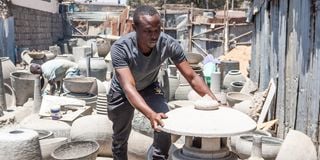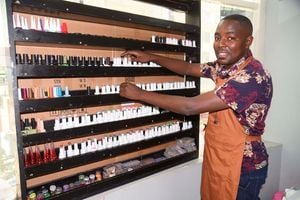
Studio Erickss founder Erickson Ondieki at his workshop in Rongai Kajiado County on September 10, 2024.
When Erickson Ondieki started making concrete pots, it was never a coincidence but rather an interest that he had harbored for more than five years.
A landscape architect by training, Erick, as his colleagues call him, has always had a love of flowers and plants. His story took a turn when the Covid-19 pandemic hit Kenya and schools were closed for about nine months.
“I was in my last semester in university at Jomo Kenyatta University of Agriculture and Technology (Jkuat), about to graduate. During the pandemic break, I started working online to make ends meet. Over time, the financial pressure became too much and I felt the need for something more sustainable that would also allow for personal growth. As a result, I haven’t gone back to university since,” he tells Nation Lifestyle during an interview at his workshop.
Five years later, Erick is living his passion. He is revolutionizing the space by providing unique decorative concrete planters for garden owners.
He founded Studio Erickss, which is based in Rongai, Kajiado County. But the road to perfection has not been smooth. The first time he tried to make planters out of concrete, he followed the instructions to the latter, but it fell apart.
“I have always been attracted to landscaping. As a plant lover and designer, I became interested in concrete pots. At first, I tried to make a few with the help of YouTube. They turned out well, and I even painted them. My neighbour liked them so much that he bought them," he says.
However, after adding water and plants, the pot cracked. I used white cement, just like I saw on YouTube, so I didn’t understand why it broke,” he recalls.
At one point, he even wobbled but emerged stronger than ever after meeting a friend.
“I tried a different method by dipping the pot in water first, but the result was the same, which was a bit disappointing. I eventually gave up on the idea. Later, I came across a new competitor. I visited them and decided to start again, but this time as a reseller,” he says.

A stepped sphere pictured on September 10, 2024 at Studio Erickss workshop in Rongai.
Erick’s quest to explore his passion led him to leave his job as a reseller to embark on his journey as a designer.
He sought out skilled stonemasons to help him get his business off the ground. He has since employed five craftsmen.
“As a designer, creating the pot itself is a challenge. But I also wanted the freedom to develop my designs. As a reseller, there are limitations in terms of space and the ability to explore and create new designs,” he explains.
“If a client wants a specific design, they send me a photo. If they haven't provided any measurements, I do a reverse image search to get them. I use a computer to create a 3D model, which I then send to the client for approval. After approval, I convert the drawing into a sticker by printing it,” he explains.

A template used to mold concrete pots at Studio Erickss workshop in Rongai Kajiado County on September 10, 2024.
Erick has over 100 designs of planters in his 20 by 75-metre space. His products may look simple, but they take hours to make.
“There is at least 168 hours of work in each one,” he says. “I cut everything out by hand. I make the mould, and then there is the actual mixing of the concrete. You have to sift it. I learnt all these new techniques and failures that push you in the direction of doing something different.
"To finish a pot, it depends on the design and the size. A large one takes seven days to complete, including drying," he says.
“To make the shape, I use a foam template to cut it out. At this stage, it is not sustainable," he says. He uses concrete with a mesh for extra strength.
The lightest pot, he says, weighs 10kg and the heaviest about 300kg. As the pots use a lot of water, his well in the workshop comes in handy.
The names are inspired by major industry players such as Long Shadow Planters. Some are names of the first customers of the design, others are named after lakes.
These include Nyanga, Victoria, Asmara, Kananga, Ulu, Ridge Trough, Dala, Chilwa, Tanganyika and many more. The smallest pot costs an average of Sh1,000 to make, while the larger one costs Sh5,000.
He sells to homeowners and designers. His customers come from Karen, Westlands and Kiambu Road. He also has customers from Kisumu, Mombasa and Eldoret. Because his customers come from far, he has invested in online sales.
At first, he was skeptical because the internet is full of scammers. But when his target customers started sending him messages and making inquiries, he knew he was up to the task.
"It took off from there," he says.
The pots range from Sh2,100 to Sh15,000, depending on the size and complexity of the piece. They are made to order because of their delicate nature.

Concrete pots at Studio Erickss workshop in Rongai Kajiado County on September 10, 2024.
In a week, he receives up to five orders a day. The business, he says, has cost him Sh2 million so far, but still in its early stages, he is optimistic that he will reap the fruits of his labour.
"The business is still young, but it's sustaining us," he says.
One of the challenges for him has been sourcing the right materials: “We are a small company. Some of the things I wish I had are just not readily available, and they are so expensive.”
He buys his raw materials from local suppliers, including wire mesh from industrial estates, cement and sand from hardware stores.
"Sometimes the orders are full, but the materials are not enough or the customers have not paid a deposit or have paid a very small deposit," he says.
Their fragile nature has cost him Sh30,000 so far.
“The challenge is transport. I have lost several pots to breakage in transit,” he says.
But one thing is certain. "Demand is high. I am optimistic. I plan to have a factory and a depot. I am also looking forward to having a showroom with some of the pots and plants," says the 29-year-old.







